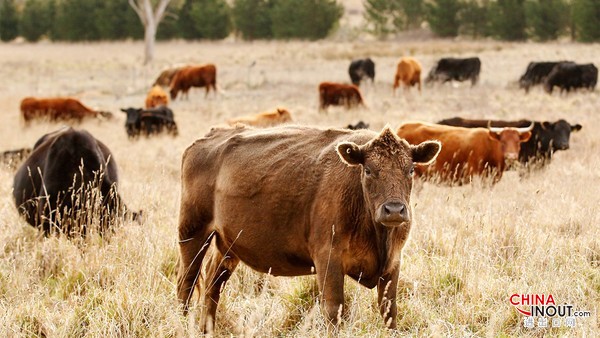中國買家正籌劃在澳大利亞競購面積相當于英格蘭四分之三大小的土地(連同近20萬頭牛),這突顯出中國新崛起的中產階層對肉類日益增長的需求。
Dealogic的數據顯示,中國日益偏重肉類的飲食結構使得中國企業僅在過去五年里就為食品領域的跨境收購支付了近200億美元。但由于美國等國擔憂本國的食品安全問題,中資企業的收購也帶來了沖突。
現在輪到澳大利亞新任總理馬爾科姆·特恩布爾(MalcolmTurnbull)出馬了,他領導的政府不得不在外來農業投資的好處與對不斷擴大的外資所有權的擔憂之間進行權衡。全部都是民營企業。
養牛業顧問公司Comet Line Consulting的主管戴維·貝維斯托克(David Baveystock)說:"我們看到來自亞洲(尤其是中國)的投資者興趣增加,他們希望在澳大利亞和新西蘭獲得食品或土地資產,以滿足亞洲日益擴大的中產及上流階層不斷增長的食品需求。"
掛牌出售的是家族企業S Kidman and Co,該公司控制著澳大利亞內陸地區超過10萬平方公里牧場的租賃權,并擁有近20萬頭牛。預計售價將為3.25億澳元(合2.35億美元)。被認為有望中標的企業包括總部位于廣州的植物油生產商東凌糧油(Donlinks Grain and Oil Company)、上海鵬欣(Shanghai Pengxin)以及一個由上海中房置業(Shanghai CRED)牽頭的財團。全部都是民營企業。
過去兩年,來自亞洲、美國的需求猛增,使牛肉價格大幅上漲。旱災使美國畜群數量降至60年來的最低水平。在澳洲,局部地區干旱以及澳元貶值已將畜牛價格推升至歷史高位。
房地產大亨姜照柏所擁有的上海鵬欣控制著中國內地一家生豬養殖企業轉型成的乳制品集團。上海鵬欣在新西蘭投資了幾十家奶牛場,包括2012年一項對新西蘭最大私人乳制品集團——克拉法牧場(Crafar Farms)的引發爭議的收購。
上月,新西蘭否決了上海鵬欣旗下子公司斥資8800萬新西蘭元(合5800萬美元)收購面積1.38萬公頃的Lochinver牛羊養殖場交易案。在評論這項與該國的外國投資審查機構建議相悖的裁決時,新西蘭土地信息部部長路易絲·厄普頓(Louise Upton)稱,新西蘭可獲得的益處"不夠多"。
新西蘭農業貿易特使邁克·彼得森(Mike Petersen)說,這"意味著所有外國競標者在試圖收購土地所有權時都將發現事情已經變得更具挑戰性"。上海鵬欣拒絕對此置評,只是說無法聯系到姜照柏,也不能給他留言。
2012年,一個由紡織巨頭山東如意(Shandong Ruyi)牽頭的財團斥資2.32億美元收購了庫比棉場(CubbieStation)。自那以后,中國企業對澳大利亞農業資產的興趣與日俱增。
受到中國牛肉及乳制品需求強勁的吸引,過去一年,澳大利亞億萬富翁們已開始收購農業資產。澳大利亞首富吉娜·萊因哈特(Gina Rinehart)、礦業大亨安德魯·佛萊斯特(Andrew "Twiggy" Forrest)以及格里·哈維(Gerry Harvey)旗下的零售集團哈維諾曼(Harvey Norman)都收購了養牛場。
澳大利亞統計局的數據顯示,截至2013年6月,外資在該國農業領域的所有權仍然不多,占總農業用地的10%、農業企業的1%(這是可得的最新數據)。
然而,過去兩年,中國投資已開始更自由地流入葡萄園、海產品、養牛場和乳制品行業。上月,國有的北京農業產業投資基金(Beijing Agricultural Investment Fund)與總部位于深圳的玉湖集團(Yuhu Group)共同設立了規模為30億澳元的基金用于投資澳大利亞農業。這加劇了澳大利亞地方當局對外資所有權的政治擔憂,盡管業內專家指出,澳大利亞需要外來投資實現農場現代化、增加產出以提振出口。
2013年12月,澳大利亞政府曾阻止美國跨國公司——ADM公司(Archer Daniels Midland)以34億澳元收購谷物處理企業GrainCorp的交易,反映出自由黨(Liberal party)的執政聯盟伙伴——傳統上根植鄉村的國家黨(National party)施加的壓力。
今年7月,澳大利亞將私人收購農業用地必須經過審批的門檻從2.52億澳元下調至1500萬澳元。此外,堪培拉正在制定一項外資擁有農業用地所有權的登記制度,并將于2016年頒布。
澳大利亞副總理、國家黨領導人沃倫?特拉斯(Warren Truss)上月在接受《澳大利亞財經評論報》(Australian Financial Review)采訪時表示:"如果沒有澳大利亞買家的話,將令人失望。"
安永(EY)南澳大利亞管理合伙人唐·馬尼福爾德(Don Manifold)說,S Kidman的出售在澳大利亞國內外都引起了興趣,一些企業已開始咨詢澳大利亞外國投資審查委員會(Foreign Investment Review Board)。
"我們希望不久就選出最終的投標人,并在今年年底之前完成所有談判,"他說。(中國進出口網)
Chinese buyers are hatching bids for parcels of Australian land covering an area three-quartersthe size of England complete with nearly 200,000 cattle, highlighting China's growing demandfor meat to feed its rising middle classes.
China's increasingly carnivorous diet has seen companies fork out almost $20bn on cross-border food deals in the past five years alone, according to Dealogic. But it has also broughtconflict as countries such as the US fret about their own food security issues.

Now it is the turn of Malcolm Turnbull, Australia's new prime minister, whose government mustweigh the benefits of inward agricultural investment against concerns over increasing foreignownership. On the block is family-owned.
S Kidman and Co, which controls pastoral leases covering more than 100,000sq km in theoutback and owns almost 200,000 cattle. It is tipped to fetch A$325m (US$235m). Thosebelieved to be in the running include Donlinks Grain and Oil Company, a Guangzhou-basedvegetable oil producer; Shanghai Pengxin; and a consortium led by Shanghai CRED. All areprivately owned.
"We are seeing increased investor interest from Asia, particularly China, to acquire food orland assets in Australia and New Zealand to support the growing food demand from Asia'sgrowing middle and upper classes," said David Baveystock, director at Comet Line Consulting,an adviser in the cattle sector.
Beef prices have increased sharply over the past two years on surging demand from Asia andthe US, wher a drought has reduced the national herd to its lowest level in 60 years. InAustralia, regional droughts and a fall in the Australian dollar have driven cattle prices to recordhighs.
Shanghai Pengxin is owned by Jiang Zhaobai, a real estate billionaire, and controls a hogproducer turned dairy group in mainland China. It has invested in dozens of dairy farms in NewZealand, including a controversial 2012 acquisition of Crafar Farms, the country's largestprivate dairy conglomerate.
Last month, New Zealand rejected an NZ$88m (US$58m) bid by a subsidiary of ShanghaiPengxin for the 13,800-hectare Lochinver sheep and cattle station. Louise Upton, NewZealand's land information minister, said the benefits were "not substantial enough", in a rulingthat went against the advice of the country's foreign investment watchdog.
This "means all foreign bidders will find it more challenging when they attempt to buylandholdings," said Mike Petersen, New Zealand's envoy for agricultural trade. Shanghai Pengxinwould not comment other than to say that Mr Jiang could not be reached and a message couldnot be left for him.
Chinese interest in Australian agriculture has gathered pace since 2012 when a consortium ledby textile giant Shandong Ruyi bought Cubbie Station, a cotton farm, for $232m.
Attracted by China's beef and dairy appetite, Australian billionaires have begun to acquireagricultural interests over the past year. Gina Rinehart, Australia's richest person, Andrew"Twiggy" Forrest, the mining magnate, and retail group Harvey Norman, headed by GerryHarvey, have all bought cattle stations.
Foreign ownership in agriculture remains modest, accounting for 10 per cent of totalagricultural land and 1 per cent of agricultural companies as of June 2013, according to theAustralian Bureau of Statistics — the most recent data available.
Nevertheless, in the past two years Chinese investment has begun flowing more freely intovineyards, seafood, cattle stations and the dairy industry. The state-owned Beijing AgriculturalInvestment Fund and Shenzhen-based Yuhu group last month set up a A$3bn fund to invest inAustralian agriculture. This has intensified local political concerns about foreign ownership evenas industry experts point to the need for inward investment to modernise farms and increaseproduction to boost exports.
In December 2013, the government blocked a proposed A$3.4bn takeover of Graincorp, agrain-handling company, by US multinational Archer Daniels Midland, reflecting pressure fromthe traditionally rural National party, the Liberal party's coalition partner.
In July, Australia reduced the threshold at which private acquisitions of rural land requireapproval — from A$252m to A$15m. It is also setting up a register of foreign agriculturalland ownership, which will be made public in 2016.
Warren Truss, deputy prime minister and National party leader, told the Australian FinancialReview newspaper last month that it "would be disappointing if there are no Australianbuyers".
Don Manifold, managing partner at EY South Australia, said the S Kidman sale had attractedboth overseas and domestic interest and certain parties had already begun consulting theForeign Investment Review Board.
"We are seeking to have a final bidder selected shortly and have all negotiations completed bythe end of the year," he said.











